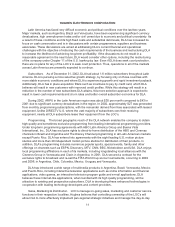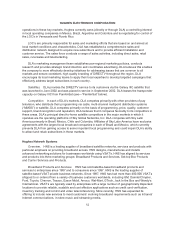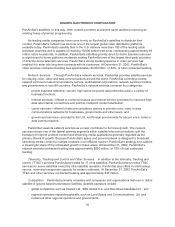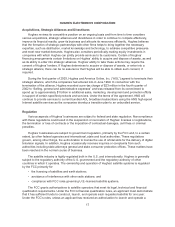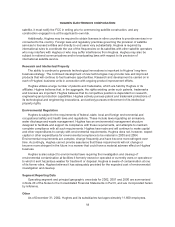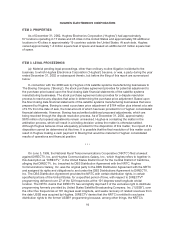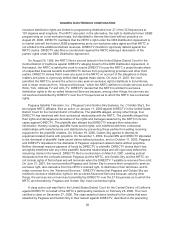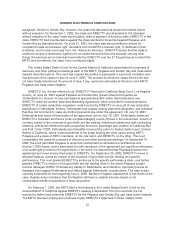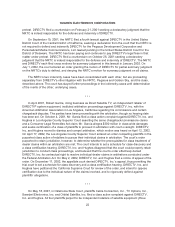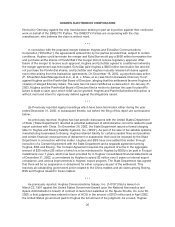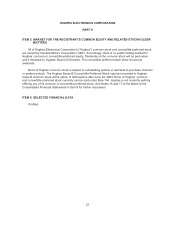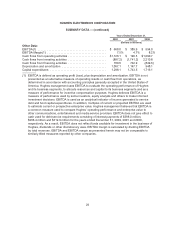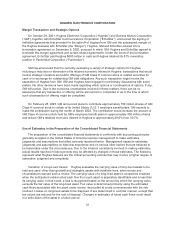DIRECTV 2002 Annual Report Download - page 31
Download and view the complete annual report
Please find page 31 of the 2002 DIRECTV annual report below. You can navigate through the pages in the report by either clicking on the pages listed below, or by using the keyword search tool below to find specific information within the annual report.HUGHES ELECTRONICS CORPORATION
paragraph. Similar to Golden Sky, however, the class has dismissed its equipment-related claims
without prejudice. On November 1, 2002, the class and DIRECTV also stipulated to the dismissal
without prejudice of the class’ trade secret claims, without payment of funds by either DIRECTV or the
class. DIRECTV filed counterclaims against the class identical to those filed against Pegasus and
Golden Sky as described above. On June 21, 2001, the class was also permitted to amend its
complaint to seek an exclusive right, derivative from the NRTC’s claimed right, to distribute in their
territories, and to retain revenues from, the “Advanced Services.” DIRECTV denies that the class is
entitled to exclusive distribution rights to the so-called Advanced Services because, among other
things, the services are not services transmitted by DIRECTV over the 27 frequencies as to which the
NRTC and derivatively, the class, have contractual rights.
The United States District Court for the Central District of California consolidated for purposes of
discovery and other pretrial proceedings each of the NRTC, Pegasus and Golden Sky and class action
lawsuits described above. The court has ordered the parties to participate in a pre-trial mediation and
has set each of the cases for trial on June 3, 2003. The process by which the cases will be tried has
not been finally determined. An amount of loss, if any, cannot be estimated at this time in the NRTC,
Pegasus and class action litigation.
DIRECTV, Inc. (herein referred to as “DIRECTV”) filed suit in California State Court, Los Angeles
County, on June 22, 2001 against Pegasus and Golden Sky (herein referred to together as
“Defendants”) to recover monies calculated at approximately $52 million that Defendants owe
DIRECTV under the parties’ Seamless Marketing Agreement, which provides for reimbursement to
DIRECTV of certain subscriber acquisition costs incurred by DIRECTV on account of new subscriber
activations in Defendants’ territory. Defendants had ceased making payments altogether, and indicated
that they did not intend to make any further payments due under the agreement. On July 13, 2001,
Defendants sent notice of termination of the agreement and on July 16, 2001, Defendants answered
DIRECTV’s complaint and filed a cross complaint alleging counts of fraud in the inducement, breach of
contract, breach of the covenant of good faith and fair dealing, intentional interference with contractual
relations, intentional interference with prospective economic advantage and violation of California Bus.
and Prof. Code 17200. Defendants also thereafter removed the action to federal district court, Central
District of California, where it was transferred to the judge hearing the other cases among NRTC,
Pegasus and a class of NRTC members, on the one hand, and DIRECTV on the other. The court
consolidated the cases for purposes of discovery and other pretrial proceedings. On September 16,
2002, the court permitted Pegasus to amend its counterclaim to eliminate the interference and
Section 17200 claims, and to add claims for both rescission of the agreement and specific performance
of an audit right provided in the agreement, in the event it is determined that Pegasus breached the
agreement and owes money thereunder to DIRECTV. On September 30, 2002, DIRECTV moved to
dismiss Pegasus’ claims for breach of the covenant of good faith and fair dealing and specific
performance. The court granted DIRECTV’s motion as to the specific performance claim, and further
granted DIRECTV’s motion on the good faith and fair dealing claim to the extent Pegasus sought
punitive damages. DIRECTV denies any liability to Defendants, and intends to vigorously pursue its
damages claim against Defendants and defend against Defendants’ counterclaims. The case is also
currently scheduled for trial beginning June 3, 2003. Based on Hughes’ assessment of the merits of the
case, Hughes does not believe that the litigation will have a material adverse impact on its
consolidated results of operations or financial position.
On February 1, 2001, the NRTC filed a third lawsuit in the United States District Court for the
Central District of California against DIRECTV seeking a declaration from the court that it is not
required to defend and indemnify DIRECTV for the Pegasus and Golden Sky and class action lawsuits.
The NRTC has been paying and continues to pay DIRECTV’s legal fees in those matters under
21


